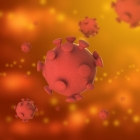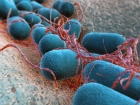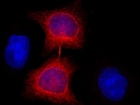Press monitoring
Designing long-lived peptides for more powerful medicines
30.10.2024 | Press monitoring
"Peptides are potentially powerful components of medicines, because they're just fragments of our natural proteins that our bodies can recognize," said University of Virginia assistant professor of chemical engineering Rachel Letteri. "But one limitation is that they tend to break down quickly, so we need to figure out how to make them more...
CRISPR-Cas10 can flood virally infected bacteria with toxic molecules, researchers discover
28.10.2024 | Press monitoring
CRISPR-Cas9 has long been likened to a kind of genetic scissors, thanks to its ability to snip out any desired section of DNA with elegant precision. But it turns out that CRISPR systems have more than one strategy in their toolkit. A mechanism originally discovered in bacteria, where it has operated as an adaptive immune system for eons, CRISPR...
AI-designed DNA switches flip genes on and off, allowing precise activation or repression
25.10.2024 | Press monitoring
Researchers at The Jackson Laboratory (JAX), the Broad Institute of MIT and Harvard, and Yale University, have used artificial intelligence to design thousands of new DNA switches that can precisely control the expression of a gene in different cell types. Their new approach opens the possibility of controlling when and where genes are...
Unique mRNA delivery method could fix faulty genes before birth
23.10.2024 | Press monitoring
A new study shows that a biomedical tool can successfully deliver genetic material to edit faulty genes in developing fetal brain cells. The technology, tested in mice, might have the potential to stop the progression of genetic-based neurodevelopmental conditions, such as Angelman syndrome and Rett syndrome, before birth. "The implications of...
Team develops promising new form of antibiotic that makes bacterial cells self-destruct
21.10.2024 | Press monitoring
To address the global threat of antibiotic resistance, scientists are on the hunt for new ways to sneak past a bacterial cell's defense system. Taking what they learned from a previous study on cancer, researchers from the University of Toronto (U of T) have developed novel compounds that trigger bacterial cells to self-destruct. The new form of...
Nano-nutrients can blunt effects of soil contamination, boost crop yields
18.10.2024 | Press monitoring
Research recently published in Nature Food by an international team of scientists led by the University of Massachusetts Amherst, Guangdong University of Technology, and Central South University of Forestry and Technology, has shown that nutrients on the nanometer scale can not only blunt some of the worst effects of heavy metal and metalloid...
New bacteria-based therapy shows promise for fighting cancer
16.10.2024 | Press monitoring
Even as cancer remains a leading cause of death globally, bacteria-based cancer therapy presents an exciting and innovative treatment option. Owing to their ability to penetrate the rigid stromal barrier, bacteria can naturally target solid tumors and offer intratumoral penetration. However, before these bacteria can be used in medical...
Gene-edited cells could halt multiple sclerosis progression
14.10.2024 | Press monitoring
Our bodies have the ability to repair myelin, but in multiple sclerosis (MS), and as we age, this becomes less effective. There are currently no treatments to boost this process. Scientists have used gene-editing techniques to boost the repair of nerve cells damaged in multiple sclerosis, a study shows. The innovative method, which was tested in...
Enzymes in spider venom have bioeconomic potential
11.10.2024 | Press monitoring
As venomous animals, spiders use their chemical arsenal for prey capture or defense. Small neurotoxins target the central nervous system of their victims. While the toxins are intensively investigated, scientists at the LOEWE Center for Translational Biodiversity Genomics (TBG) in Hesse, Germany, have turned their attention to the enzymes also...
Nanobody capable of limiting the side effects of opioids discovered
9.10.2024 | Press monitoring
Opioid drugs are highly effective at relieving pain but come with severe drawbacks. Their side effects range from dizziness to potentially fatal respiratory depression. Their illegal use contributes to nearly half a million deaths worldwide each year. Researchers from the University of Geneva (UNIGE) have discovered a molecule, called nanobody...































